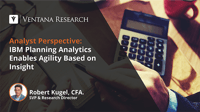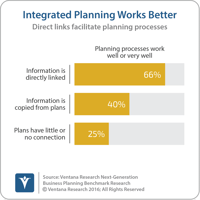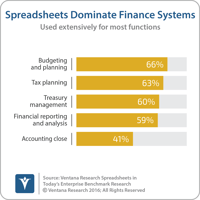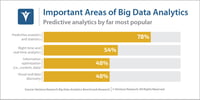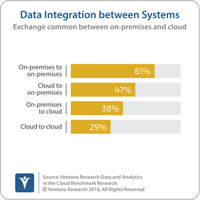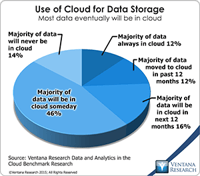IBM Planning Analytics with Watson is a comprehensive, cloud-based business planning application that supports what Ventana Research calls integrated business planning. We coined this term in 2007 to describe a high-participation approach to business planning that integrates strategy, operations and finance. Our Next Generation Business Planning Benchmark Research demonstrated the value of IBP: Organizations that link planning processes get better results. Sixty-six percent of organizations...
Read More
Topics:
Predictive Analytics,
Office of Finance,
embedded analytics,
Business Intelligence,
Business Planning,
Financial Performance Management,
Watson,
Digital transformation,
digital finance,
AI & Machine Learning,
profitability management
People analytics is a specific focus in Human Capital Management (HCM) that enables organizations to have data-driven insights that optimize the impact and value of the workforce. These analytics are essential for addressing a broad scope of HCM objectives, but while reducing compliance risks and highlighting demographic trends have dominated the people analytics landscape for decades, various technology-related advances have paved the way for these data insights to become more actionable,...
Read More
Topics:
Predictive Analytics,
Workforce Analytics,
HR Analytics
The use of blockchain distributed ledgers in business processes is now a common theme in many business software vendors’ presentations. The technology has a multitude of potential uses. However, presentations about the opportunities for digital transformation always leave me wondering: How is this magic going to happen? I wonder this because the details about how data flows from point A to point B via a blockchain are critically important to blockchain utility and therefore the pace of its...
Read More
Topics:
Planning,
Predictive Analytics,
Forecast,
FP&A,
Machine Learning,
Reporting,
budget,
Budgeting,
Continuous Planning,
Analytics,
Data Management,
Cognitive Computing,
Integrated Business Planning,
AI,
forecasting,
consolidating
Ventana Research uses the term “predictive finance” to describe a forward-looking, action-oriented finance organization that places emphasis on advising its company rather than fulfilling the traditional roles of a transactions processor and reporter. Technology is driving the shift away from the traditional bean-counting role. The cumulative evolution of software advances will substantially reduce finance and accounting workloads by automating most of the mechanical, rote functions in...
Read More
Topics:
Planning,
Predictive Analytics,
Forecast,
FP&A,
Machine Learning,
Reporting,
budget,
Budgeting,
Continuous Planning,
Analytics,
Data Management,
Cognitive Computing,
Integrated Business Planning,
AI
The treasury function in finance departments doesn’t get a lot of attention, but it’s a fundamentally important one: to ensure that all funds are accounted for and that there is sufficient cash on hand each day to meet operating requirements. Keeping track of and managing cash, especially in larger organizations, can be complicated because of multiple bank accounts, complex financing requirements and various methods of receiving and making payments; the complexity deepens when more than one...
Read More
Topics:
Predictive Analytics,
Office of Finance,
credit,
debt,
Analytics,
CFO,
cash management,
controller,
Financial Performance Management
I recently spent time at Strata+Hadoop World 2016 in New York. I attended this event and its predecessor, Hadoop World, off and on for the past six years. This one in New York had a different feel from previous events including the most recent event in San Jose at the end of March. Perhaps because of its location in one of the financial and commercial hubs of the world, the event had much more of a business orientation. But it’s not just location. Past events have been held in New York also,...
Read More
Topics:
Big Data,
Predictive Analytics,
Strata+Hadoop
I recently attended Oracle OpenWorld for the first time in several years. The message at this year’s event was clear: Oracle is all in on the cloud. I had heard the message, but I didn’t get the full impact until I arrived at the Moscone Center in San Francisco. All signage at the event contained the word “cloud,” and Oracle issued 18 press releases in conjunction with OpenWorld related to cloud computing. I also found out that Oracle has its own definition of “cloud.”
Read More
Topics:
Big Data,
Predictive Analytics,
Business Analytics,
Business Intelligence,
Cloud Computing,
Information Management
Teradata recently held its annual Partners conference, at which gather several thousand customers and partners from around the world. This was the first Partners event since Vic Lund was appointed president and CEO in May. Year on year, Teradata’s revenues are down about 5 percent, which likely prompted some changes at the company. Over the past few years Teradata made several technology acquisitions and perhaps spread its resources too thin. At the event, Lund committed the company to a focus...
Read More
Topics:
Big Data,
Predictive Analytics,
Business Analytics,
Business Intelligence,
Cloud Computing,
Information Management
Predictive analytics is a rewarding yet challenging subject. In our benchmark research on next-generation predictive analytics at least half the participants reported that predictive analytics allows them to achieve competitive advantage (57%) and create new revenue opportunities (50%). Yet even more participants said that users of predictive analytics don’t have enough skills training to produce their own analyses (79%) and don’t understand the mathematics involved (66%). (In the term...
Read More
Topics:
Big Data,
Data Science,
Predictive Analytics,
Business Analytics,
Business Intelligence,
Business Performance,
Cloud Computing
There were two noteworthy themes in SAP CEO Bill McDermott’s keynote at this year’s Sapphire conference. One was customer assurance; that is, placing greater emphasis on making the implementation of even complex business software more predictable and less of an effort. This theme reflects the maturing of the enterprise applications business as it transitions from producing highly customized software to providing configurable, off-the-rack purchases. Implementing ERP will never be simple, as I...
Read More
Topics:
Predictive Analytics,
Sales Performance,
SAP,
Supply Chain Performance,
Customer Performance,
Business Performance,
Financial Performance,
Uncategorized
